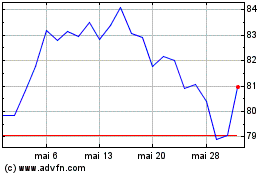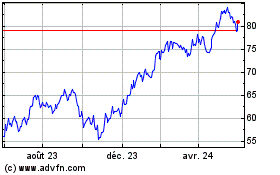A new Stifel survey finds U.S. consumer views of the importance of
brands operating sustainably has reached parity with Europe, but
also shows greater consumer concerns about the economy and personal
finances. Following three years of near-record inflation, the
survey data indicates heightened price sensitivity, just as the
holiday shopping season kicks into high gear.
While an overwhelming majority of consumers (80%) still believe
it’s important for brands to operate sustainably, only a third
(32%) highly prioritize sustainability when making purchasing
decisions, compared to other factors like good value (68%) and low
price (57%). Amid persistent inflationary pressures, consumer
prioritization of low price reflected the largest gains year over
year (up five points from 52% in 2022).
Roughly three of five consumers (63%), however, remain willing
to pay a premium for brands with leading sustainability
practices.
“We know that many consumers regularly consider and value
sustainability, especially in the active and casual lifestyle
category,” said Jim Duffy, Managing Director and Sports and
Lifestyle Brands Analyst at Stifel. “However, our survey found that
62% of consumers are more concerned about the state of the economy
this year versus last year and 56% are more worried about their
personal finances, so pocketbook issues are having a greater impact
on purchasing decisions.”
Stifel, working with Morning Consult, recently surveyed 6,053
U.S. active/causal lifestyle brand consumers ages 18-55. Other key
findings include:
- 56% (flat versus 2022) of consumers look for information about
a brand’s sustainability practices when contemplating a purchase,
70% (down from 71% in 2022) consider sustainability factors when
choosing between brands, and more than half (59% versus 58% in
2022) have purchased a new product specifically because of
sustainability reasons.
- More than three-quarters (78%) of consumers indicate they are
trying to be more sustainable in their day-to-day life (up from 75%
in 2022) and 70% indicate they care more about the sustainability
of products they buy than a year ago (versus 67% in 2022).
- Most (58%) believe that ethical business practices are “very
important” for brands to prioritize, and ranked giving workers fair
pay and benefits, paying a fair share of taxes, and promoting a
healthy work/life balance as leading priorities.
- Two-thirds of U.S. category consumers (67%) report they are
aware of brands receiving negative attention on social media for a
statement or action taken on a social issue.
- Three of five category purchasers (60%) think it’s important
for brands to take a stance on social issues but three quarters
(74%) indicate a willingness to boycott a brand if the stance was
contrary to their opinion.
“Operating sustainably is a consumer expectation, but brands
weighing in on social issues is a high-wire act,” noted Duffy.
“Consumers want brands to support their issues, but the majority
indicate they would boycott a brand that expresses views opposing
their own. Deep understanding of the customer is essential to this
risk-reward calculus.”
Global Insights
The survey also questioned 4,096 additional active/causal
lifestyle brand consumers ages 18-55 across the UK, Italy, Germany,
and France. Similar to findings among U.S. consumers, at least four
of five category purchasers across all international markets
believe it’s important for brands to operate sustainably, but the
figures declined year over year. Similar to the U.S., value and
price concerns outweigh sustainability practices as purchasing
priorities. Specific findings include:
- Sustainability as a purchasing priority remained essentially
flat compared to last year in the UK (35%) and Italy (40%) but
declined year to year in France (52% versus 59% in 2022) and
Germany (36% versus 39% in 2022).
- “Good value” ranked as the top consideration when making
purchasing decisions, with consumers in Italy (74% versus 75% in
2022), France (72% versus 70% in 2022), the UK (72% versus 69% in
2022), and Germany (71% flat versus 2022) versus 68% of U.S.
consumers.
- The importance of “low price” as a purchasing priority
increased over the last year, with French (55% versus 47% in 2022),
Italian (45% versus 40% in 2022), German (40% versus 35% in 2022),
and UK consumers (53% versus 50% in 2022) listing it as a “top
three” purchasing priority versus 57% of U.S. consumers (up from
52% in 2022).
- Brand environmental efforts are viewed as less important year
to year across each of the European markets, including using less
energy and water, using more renewable or recycled materials,
reducing carbon emissions, and advocating for environmental causes
publicly.
- In the past year, half or more of consumers have become more
concerned about the state of the economy (UK 69%, Italy 65%, U.S.
62%, Germany 59%, and France 58%) and personal finances (UK 63%,
France 62%, U.S. 56%, Italy 53%, and Germany 50%).
“European markets have historically led the U.S. in concern for
brand sustainability, but that gap has narrowed amid economic
pressures,” added Duffy. “The broad-based 2023 European declines in
perception of the importance of brand focus on environmental
efforts may signal ‘sustainability fatigue’ and the peak in
European consumer sustainability concern.”
Full survey results can be found here.
Updating the Stifel Sustainable Lifestyle Brands
Index
In conjunction with the survey, Stifel is updating the “Stifel
Sustainable Lifestyle Brands Index,” which ranks brands based on
U.S. active/casual lifestyle consumer perception of brand
sustainability practices. Brands were measured according to three
metrics of sustainability: environmental, social, and ethical
business practices.
For the third year in a row, Bombas was rated the top
sustainable brand, followed by Yeti (No. 2) and The North Face (No.
3). In fact, Bombas scored highest in each of the three metrics
considered.
Rounding out the top ten are: Carhartt (tied at No. 4),
Patagonia (tied at No. 4), Allbirds (No. 6), Adidas (No. 7),
Columbia (tied at No. 8), Under Armour (tied at No. 8), and
Smartwool + Levi’s (No. 10).
Survey Methodology
Morning Consult conducted n=11,551 online interviews among
general population adults ages 18-55 and active/casual lifestyle
brand purchasers ages 18-55 in the U.S., UK, Italy, Germany, and
France from October 23-30, 2023. Sampling included approximately
n=1,000 general population adults in each market, and an oversample
of active/casual lifestyle brand purchasers in each market.
General population adults and active/casual lifestyle brand
purchasers were separately sampled and weighted to be
demographically representative for their age groups according to
published population statistics for age, gender, region, education,
race, and income in the U.S., and age, gender, region, and
education in the UK, Italy, Germany, and France. Active/casual
lifestyle brand purchasers are defined as those who purchased at
least one of the following types of brands within the past six
months: athletic or activewear clothing or footwear brands; casual
lifestyle clothing or footwear brands; outdoor clothing or footwear
brands (i.e., for hiking, skiing, etc.); or sporting goods or
outdoor recreation equipment brands.
Sustainable Lifestyle Brand Index
Methodology
Stifel and Morning Consult measured sustainability ratings for
50 active/casual lifestyle brands with leading sustainability
practices among n=4,756 active/casual lifestyle brand consumers in
the U.S. Active/casual lifestyle brands were measured according to
three metrics of sustainability: environmental sustainability,
ethical business practices, and social sustainability. Index scores
for each of these metrics were calculated according to the
following methodology, and then averaged together to compute the
overall Sustainable Lifestyle Brand Index Score.
Calculations for each brand focus on those who selected a
response on Stifel’s four-point scale, excluding those who selected
“Don’t Know/No Opinion.” Raw scores were calculated for each brand
by adding value for positive ratings and subtracting value for
negative ratings. “Excellent” and “Poor” were given twice the
weight of “Good” and “Just Fair” to ensure more polarized views
were reflected in the scores. Finally, raw scores were converted to
index scores, where the average score for each metric is indexed to
100. This ensures Stifel’s three metrics are uniform, and have
equal weight when averaged together to compute the overall
Sustainable Lifestyle Brand Index Score.
Stifel Company
Information
Stifel Financial Corp. (NYSE: SF) is a financial
services holding company headquartered in St. Louis, Missouri, that
conducts its banking, securities, and financial services business
through several wholly owned subsidiaries. Stifel’s broker-dealer
clients are served in the United States through Stifel, Nicolaus
& Company, Incorporated, including its Eaton Partners and
Miller Buckfire business divisions; Keefe, Bruyette & Woods,
Inc.; and Stifel Independent Advisors, LLC; in Canada through
Stifel Nicolaus Canada Inc.; and in the United Kingdom and Europe
through Stifel Nicolaus Europe Limited. The Company’s broker-dealer
affiliates provide securities brokerage, investment banking,
trading, investment advisory, and related financial services to
individual investors, professional money managers, businesses, and
municipalities. Stifel Bank and Stifel Bank & Trust offer a
full range of consumer and commercial lending solutions. Stifel
Trust Company, N.A. and Stifel Trust Company Delaware, N.A. offer
trust and related services. To learn more about Stifel, please
visit the Company’s website at www.stifel.com. For global
disclosures, please visit
https://www.stifel.com/investor-relations/press-releases.
Media Contacts Neil Shapiro, +1 (212) 271-3447
shapiron@stifel.com
Photos accompanying this announcement are available
at:https://www.globenewswire.com/NewsRoom/AttachmentNg/7d1e3f9f-3e59-4f8b-b074-5db3ce1b70efhttps://www.globenewswire.com/NewsRoom/AttachmentNg/421f4a09-5ae5-4588-96e5-8a6d36df7511
Stifel Financial (NYSE:SF)
Graphique Historique de l'Action
De Oct 2024 à Nov 2024

Stifel Financial (NYSE:SF)
Graphique Historique de l'Action
De Nov 2023 à Nov 2024


